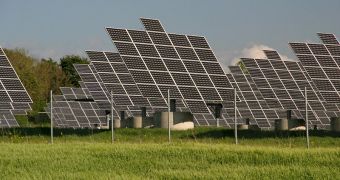Climate change effects already noticeable in some parts of the globe will also change the way humankind will exploit Earth's resources. Nuclear power plants will have to come up with effective techniques of keeping water cool, while the melting ice in the Arctic can reveal new sources of fossil fuel. But nothing compares to the boost given to solar power industry.
A recent study shows global warming could increase the potential of solar power industry in Europe. A team of experts University of Leeds reached the conclusion that the amount of sunlight we receive is going to suffer modifications, as a response to changing cloud cover, the Guardian reports.
Scientists have taken both methods of harnessing solar power into consideration: the already common photovoltaic panels (PV) and concentrated solar power plants (CPS) depending on mirror to attract sunlight to heat a particular surface and then use the heat to obtain energy.
Surprisingly, while the solar industry will flourish in some countries, other nations will experience significant losses in this line of business. The recent report highlights that Germany will benefit from the most considerable boost, almost 3% for PV and up to 10% for CPS.
The same path will be followed by the UK, whose market is currently affected by the uncertainty surrounding the proposed incentive cuts for solar power installations, a situation that made several companies abandon their projects. China and Europe will also be advantaged by the effects of climate change.
At the same time, climate change is pulling the industry down in other nations, like Saudi Arabia and the south-west US, which will suffer considerable losses of up to 6% for both green solar-powered technologies. Perhaps, one of the most intriguing facts is that CPS and PV predictions vary for the same country.
Scientists explain that these contradictory results are justified, since PV installations are more efficient in cooler conditions, while CPS technology can cope better with raising temperatures.
Their findings are a source of inspiration for solar power developers that will be able to estimate which areas are more suitable for future investments. While solar power development could be boosted by climate change, incentives are still a vital part of this puzzle, note the scientists.
"We have shown, perhaps surprisingly, that climate change will have a positive impact on the output of solar power plants in many parts of the world. This further strengthens the case for research and investment in solar power today. Subsidies play a vital role in driving down the cost of solar technology. Cutting subsidies would only have a negative effect," said Rolf Crook, one of the authors of this study.

 14 DAY TRIAL //
14 DAY TRIAL //